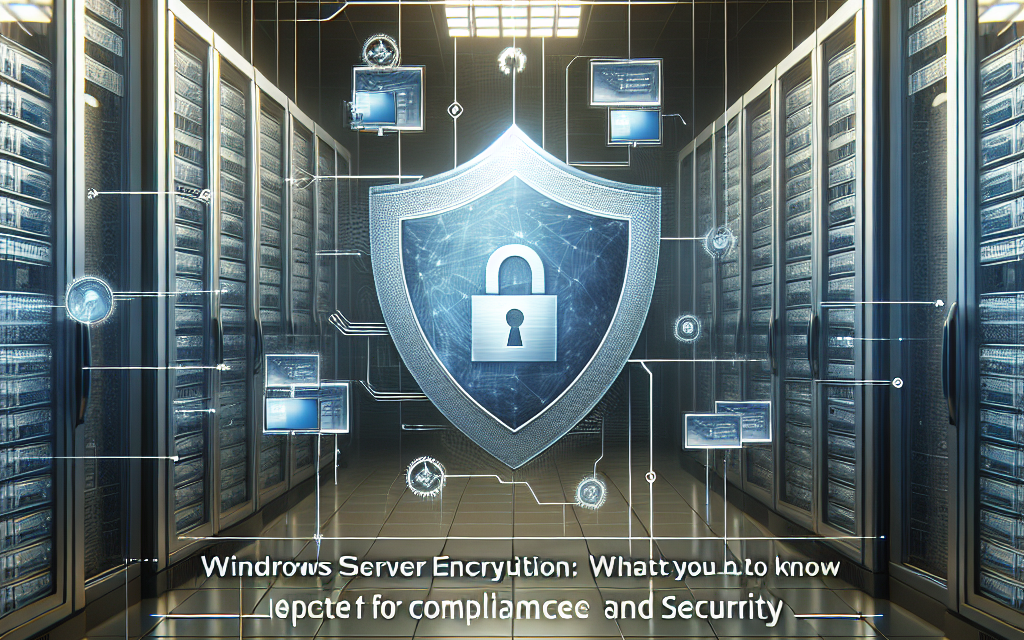In today’s digital landscape, data protection is paramount. With increasing regulatory requirements and sophisticated cyber threats, organizations must prioritize encryption on their Windows Server environments. This article explores the essentials of Windows Server encryption, its compliance implications, and best practices for enhancing security.
Understanding Encryption
What is Encryption?
Encryption is the process of converting data into a code to prevent unauthorized access. It ensures that sensitive information remains confidential, even if intercepted. In Windows Server, encryption is integrated at various levels, protecting files, folders, and entire drives.
Why is Encryption Important?
- Data Protection: Encrypting sensitive data mitigates the risks associated with data breaches.
- Regulatory Compliance: Many industries are governed by regulations requiring data encryption (e.g., HIPAA, GDPR).
- Data Integrity: Encryption helps maintain data integrity by preventing unauthorized modifications.
Types of Encryption in Windows Server
1. BitLocker Drive Encryption
BitLocker is a built-in Windows feature that provides full disk encryption. It secures the operating system drive and any other fixed data drives.
-
Advantages:
- Protects data at rest.
- Uses Trusted Platform Module (TPM) for secure key management.
- Requirements:
- Windows Server editions that support BitLocker (e.g., Datacenter, Standard).
- TPM chip or USB flash drive for key storage.
2. File Encryption
Windows Server also supports file-level encryption through the Encrypting File System (EFS). This feature allows individual files or folders to be encrypted.
- Advantages:
- Granular control over which files are encrypted.
- Easy to set up via the file properties dialog.
3. Transport Layer Security (TLS)
TLS encrypts data in transit over networks, ensuring secure communication between servers and clients. It’s essential for safeguarding sensitive data during transmission.
- Implementation:
- Configure HTTPS for web applications.
- Use TLS for email communication and other services.
Compliance Considerations
Regulatory Frameworks
Adhering to regulatory frameworks is crucial for protecting sensitive data. Key regulations include:
- HIPAA: Requires encryption for health-related data to protect patient privacy.
- GDPR: Mandates encryption for personal data to ensure accountability and transparency.
- PCI-DSS: Enforces encryption for payment information to safeguard against fraud.
Best Practices for Compliance
- Inventory Sensitive Data: Identify and classify sensitive data that requires encryption.
- Implement Robust Access Controls: Limit access to encrypted data to authorized personnel only.
- Regular Audits: Conduct audits to ensure compliance with encryption policies and regulations.
Best Practices for Security
- Use Strong Encryption Algorithms: Ensure that strong encryption protocols (e.g., AES-256) are employed to enhance security.
- Regularly Update Software: Keep Windows Server and its components up to date to mitigate vulnerabilities.
- Educate Employees: Provide training on the importance of data encryption and secure handling practices.
- Backup Encrypted Data: Regularly back up encrypted data to recover lost information without compromising security.
Conclusion
Windows Server encryption is a vital component of a comprehensive security strategy. By understanding the various types of encryption available, recognizing the importance of compliance, and implementing best practices, organizations can safeguard their sensitive data against potential threats. Empowering your IT team with the knowledge and tools to effectively manage encryption will not only enhance security but also ensure compliance in an increasingly regulated environment.
For more insights on ensuring your Windows Server environment meets compliance and security standards, visit the WafaTech blog frequently. Stay informed, stay secure!





